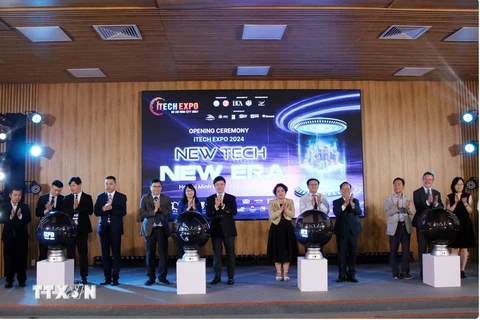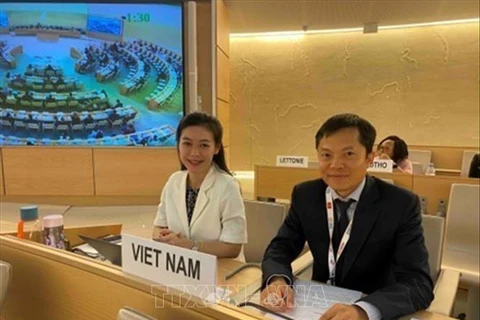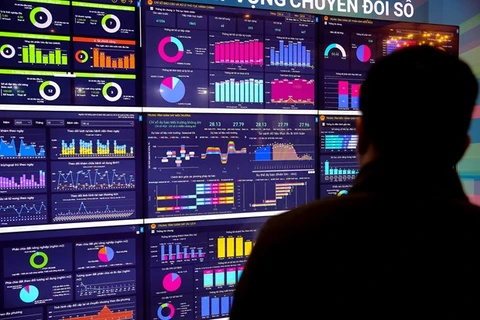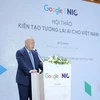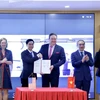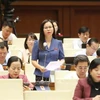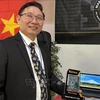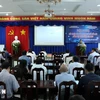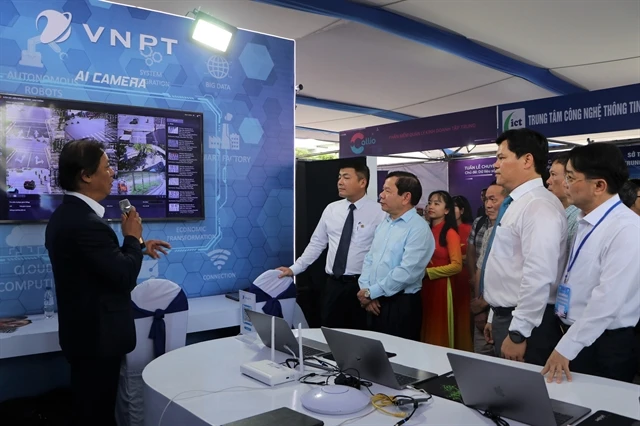
Hanoi (VNS/VNA) - The Ministry of Information and Communications (MIC) on August 12 held a working session with relevant ministries and agencies to collect feedback on the draft Law on Digital Technology Industry before submitting it to the Government and the National Assembly.
Speaking about the draft Law on Digital Technology Industry, Pham Thuy Hanh, Deputy Director of the Government Office’s Legal Department, said that the draft should focus on two main policies: investment incentives and a mechanism for experimental licensing.
"To develop the digital technology industry, the most crucial aspect is investment incentives, investment procedures, tax policies and incentives and related policies, in the direction of supporting the MIC to offer the highest level of incentives as this sector needs to develop and expand during this period," she said.
Meanwhile, Do Van Su, Deputy Director of the Ministry of Planning and Investment’s Foreign Investment Agency, proposed policies for 'digital technology zones' within the Law on Digital Technology Industry, which should be aligned with the law on industrial parks and economic zones, which is being drafted by the Ministry of Planning and Investment.
Regarding the incentive policies, the Ministry of Planning and Investment’s representative suggested that the lead drafting unit of the Law on Digital Technology Industry should hire professional consulting firms to review each legal provision.
The working session was attended by Deputy Minister of Information and Communications Bui Hoang Phuong, representatives from the Government Office, the Ministry of Planning and Investment, the Ministry of Finance, and the Department of Information and Communications Technology Industry (under the MIC) - the lead drafting unit.
It aimed to gather input from state agencies to ensure that the draft law would adequately address the practical needs and requirements of the digital technology industry. It also sought to ensure effective coordination among ministries, departments and agencies during the implementation and oversight.
The feedback emphasised the necessity of completing the legal framework to keep pace with the rapid development of technology while safeguarding the interests of digital technology enterprises, thereby contributing to the growth of the digital technology industry as a significant economic contributor to the country.
Previously, under the assignment of the Prime Minister, the MIC has been leading the development of the draft Law on Digital Technology Industry, working closely with other related ministries, agencies, localities and organisations.
The draft law has proposed a number of policies to promote the development of the digital technology industry, develop the brand of Vietnam's digital technology industry and develop domestic and foreign markets, as well as policies on investing, purchasing and selecting suppliers of digital technology products and services using State budget capital.
The State provides partial financial support when organisations and businesses participate, with a minimum support level of 30% and a maximum of no more than 80% of the total cost.
In addition, the draft law proposes that enterprises with projects to produce digital technology products may borrow investment credit from the State according to the provisions of the law on investment credit and receive a loan at preferential interest rates from the Vietnam Environmental Protection Fund for the project's pollution treatment and environmental protection items.
The Law on Digital Technology Industry is being drafted to promote development while mitigating potential risks in digital technology industry activities. It also aims to address existing shortcomings in the enforcement of information technology industry regulations.
In the draft proposal, the MIC states that the current legal regulations on the information technology industry were issued over the past 17 years, at a time when the information technology industry was just starting to develop in Vietnam. These regulations have not adapted to new problems that arise in the practical development of the information technology industry.
According to the draft proposal, the Law on Digital Technology Industry will create a legal framework to promote the development of the digital technology industry into an economic sector that contributes greatly to the country's economy.
By the end of 2023, there are over 1,500 Vietnamese digital technology enterprises which are providing services and products to foreign markets, bringing in a revenue of 7.5 billion USD, according to MIC./.
